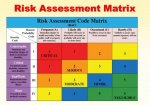I do understand what having children does to your perceptions of keeping them safe. They have to live though, so please remember to be a fun dad too. That means also letting them take their own risks now and then. If they never take risks they will not develop a sixth sense when things may start to go pear shaped and know that they need to do something else instead of blindly going forward in trust that they will be fine because dad will always be there to sort it.
Yes that's fine when they are little but you have to recognise that moment when they are ready to exercise their wings and let them.
It also totaly understand how panicked you feel about your kids getting hurt only too well. I had my worst fears confirmed when trying to steer my son away from a certain group of friends he rebelled and got in a car with others that he knew he shouldn't. He never came home. He was sixteen.
Things happen and you'll never totally mitigate for everything. Don't beat yourself up if it does. As long as you have done your best then there is nothing more you could do. Your friend needs to know that as long as he did that then it's fine.
My son made a bad choice despite being taught well , warnings, and pleadings, and even a physical fight. It took a long while to stop blaming myself, and understand it was his choice.
While this may not be your friends situation. My heart goes out to them.
It is rare for this sort of thing to happen so be at peace and give yourself a break from worrying all the time. Relax and enjoy the good times without worrying about what could happen . And enjoy what is happening right now. That way you have happy memories should the worst happen. Which is highly unlikely as far as statistics go. Whilst being prepared to cope with the worst.
Yes that's fine when they are little but you have to recognise that moment when they are ready to exercise their wings and let them.
It also totaly understand how panicked you feel about your kids getting hurt only too well. I had my worst fears confirmed when trying to steer my son away from a certain group of friends he rebelled and got in a car with others that he knew he shouldn't. He never came home. He was sixteen.
Things happen and you'll never totally mitigate for everything. Don't beat yourself up if it does. As long as you have done your best then there is nothing more you could do. Your friend needs to know that as long as he did that then it's fine.
My son made a bad choice despite being taught well , warnings, and pleadings, and even a physical fight. It took a long while to stop blaming myself, and understand it was his choice.
While this may not be your friends situation. My heart goes out to them.
It is rare for this sort of thing to happen so be at peace and give yourself a break from worrying all the time. Relax and enjoy the good times without worrying about what could happen . And enjoy what is happening right now. That way you have happy memories should the worst happen. Which is highly unlikely as far as statistics go. Whilst being prepared to cope with the worst.

